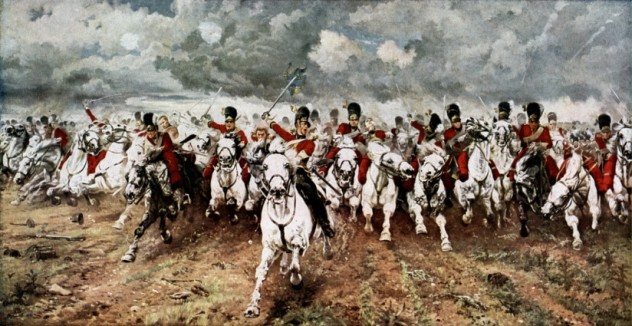A hapax legomenon is a word or phase that is unique. It appears only one time in an entire body of text. Hapax legomena can occur either in a single text or in an author’s entire works of literature, and they appear in ancient languages—Greek, Roman, Hebrew, Old English—as well as in computer science programming languages. No one can be sure of the exact meaning of these 10 instances of hapex legomena, so we can only guess their definitions based on limited context clues.
10 Aeppelfealu
Old English

Because apples come in a spectrum of colors, from green to red to multi-hued, we can’t be sure what specific color the author meant with this word. Additionally, scholars don’t agree on the exact definition of fealo. It refers to different colors in different contexts—a pale yellow or golden color that shades into red, brown, or even green. In context, aeppelfealu probably refers to a yellowish green that gradually fades into a specific shade of light brown or burgundy, but we can’t be sure.
9 Emodulanda
Latin
The word emodulanda appears in Ovid’s “Amores,” published in 16 B.C. In the “Amores,” Ovid presents love poetry in elegiac couplets about his crush on a girl named Corinna. Occurring in the last line in Book 1.1, emodulanda is a gerundive—the future passive participle verb form—that does not appear anywhere else in all of Latin literature.
In context, Ovid is telling his audience that love rather than war will be the topic of his poetry, and that elegiac couplets are the appropriate meter with which to describe romantic love. Ovid emphasizes the word emodulanda by boldly placing it near the middle of the line of poetry, but scholars haven’t reached a consensus about its meaning.
Some classicists think it’s synonymous with the verb modulor, meaning “to sing in a rhythm,” and Ovid simply needed the extra syllable to fit the meter. Other classicists, however, point out that Ovid and his peers purposefully used the e/ex prefix to indicate a completeness or fullness. So, the exact meaning of emodulanda remains elusive, but Ovid probably uses it to convey his feeling that his elegiac couplets are the best, most complete way to sing and celebrate his muse, Corinna.
8 Bacciballum
Latin

7 Pholkos
Greek
In Book II of Homer’s Iliad, Homer uses a word that can be transliterated as pholkos to describe Thersites, a Greek soldier who fought in the Trojan War. The problem is that pholkos doesn’t appear anywhere else in all of the ancient Greek texts we have; it only appears in line 217 of Book II of the Iliad as well as a few old scholarly commentaries about this passage of the Iliad.
In context, we know that the word is an adjective that describes how ugly Thersites is. He’s a balding hunchback who wouldn’t shut up at a banquet, and Achilles and Odysseus hated him. Some ancient scholars thought pholkos is derived etymologically from an ancient Greek word that means “one who draws up the eyes,” or someone with narrow, squinty eyes, while others believed that it referred to Thersites being circumcised. Modern translators don’t think pholkos refers to Thersites’ eyes at all, but rather to how his bowleggedness and how he dragged his foot behind him and limped. With all these differing opinions, we may never know exactly what Homer meant with pholkos.
6 Orcneas
Old English

Although we’re not exactly sure what orcneas means, scholars believe that it is related to the word orc, the Latin word orcus, and the suffix -neas. The word orc appears twice in Beowulf and refers to a cup of precious metal or treasure, which doesn’t seem related to orcneas. Another meaning of orc in Old English, though, is “ogre,” which makes more sense in the context of giants and elves.
In ancient Roman mythology, Orcus is god of the Underworld, and -neas means “corpses,” so orcneas could refer to evil, demonic spirits or hellish monsters. Inspired by reading the word orcneas in Beowulf, English fantasy writer J.R.R. Tolkien later coined the word “orc” to refer to an evil race of creatures.
5 Nep
Old English
Ever heard the word nep? It occurs exactly once in all of literature, in the Old English poem “Exodus,” a heroic epic that tells the story of the Israelites leaving Egypt and crossing the Red Sea. Old English scholars have admitted that they’re baffled by nep, and they’ve offered many unsatisfactory explanations for the word.
Nep may be related to an Old English compound word nepjlod, meaning “water at low tide,” which would tie in thematically with the water and Red Sea imagery in “Exodus.” But in context, nep is in a passage about a dying Egyptian, not about water. Other linguists think that nep is the result of a transcription error and should have been neh (near), weg (path), or neck. Still other scholars think that nep means “lacking” or “deprived of” based on the context clues. To confuse matters even more, a similar word—neap—could be related but didn’t appear in any English form until much later in the 1400s.
4 Terricrepo
Latin

In context, terricrepo refers to Victorinus, a man who had been a vociferous defender of paganism before later converting to Christianity. A true believer in the Roman gods rather than Christ, Victorinus expressed his beliefs with a terricrepo mouth. Classicists believe that terricrepo probably refers to a loud, thunderous way of speaking, although they disagree about how forceful the word’s connotations are. The meaning of terricrepo could suggest that Victorinus used his words to intimidate or terrify his opponents. Other scholars think that terricrepo may also have an added dimension of meaning; the word could allude to Egyptian cults that worshiped animals rather than Christ, so it could have a polemical, anti-Christian sentiment.
3 Chashman
Hebrew
Rabbis and Hebrew scholars describe some hapax legomena in the Old Testament as elusive, mysterious, and haunting. Chashman is one of those Hebrew words, appearing in Psalms 68:31. The section in which chashman appears relates how God’s followers will come out of Egypt and raise their hands to worship the mighty God.
Chashman is a noun that refers to the stuff God’s followers will bring with them as they leave Egypt. Biblical scholars haven’t reached a consensus about the exact meaning of chashman, but suggestions include red cloth, bronze articles, a tribute, nobles, envoys, and ambassadors. Still other scholars think the word may be a typo for the word hashmannim, meaning “leaders.” Whatever chashman means, the important idea behind it is that whatever it is, God is being praised with it.
2 Baruopa
Greek
Pindar, an Ancient Greek poet, wrote a series of Olympian Odes to celebrate the winning athletes in the ancient Olympic games. In his ninth Olympian Ode, Pindar used the word baruopa to describe Zeus.
Zeus’ thunderbolt was a literal and symbolic representation of his power as king of the gods, and baruopa is an adjective that describes Zeus, the lord of thunder. In context, Pindar describes how Zeus ordered the repopulation of the Earth after a major flood. Translations of baruopa vary between “deep-voiced,” “thundering,” “flashing,” “bright,” and “bickering.” Scholars disagree about whether the word connotes a sense of abruptness and violence, or whether it indicates a more benevolent, encouraging approach since Zeus used thunder to communicate with mortals.
Baruopa probably derives from an ancient Greek adjective that meant “quick” or “nimble” (if it described animals) or “spotted” or “glittering” (if it described armor). Scholars disagree about the exact connotations of the complex word baruopa, which may also include a sense of visual bright lightning or of victory itself, which would be fitting for Olympic Game winners, but the generally accepted meaning of the word is the sound of loud thunderclaps.
1 Polemophthoroisin
Greek

In context, polemophthoroisin modifies the word atais, which means “disasters.” Most classicists translate polemophthoroisin as “wasting by war” or “war-destroying,” but why Aeschylus used this hapax legomenon is a mystery. Perhaps Aeschylus created this new compound word to emphasize the disastrous nature of the Greco-Persian wars, or maybe he was trying to convey a more nuanced meaning that has been lost in translation.
Suzanne writes about indie music at After The Show.
Scholars have no idea who Agur, the author of Proverbs 30 was, but the ancient words he authored speak to our current reality as if they were written this very morning.
“…I am weary, O God; I am weary, O God, and worn out.” (v.1)
When asked, “How are you doing?”, the truthful answer that comes to mind these days is “I’m a little tired.” (after the culturally fixed “I’m fine” of course) As a pastor, I have observed through conversations with many people a widespread, almost universal weariness.
Weary of COVID-19. Weary of hyper-political partisanship. Weary of injustice and empty rhetoric. Weary of violence and destruction. Weary of needing to accomplish more than the body, mind, and soul were created to accomplish. Weary of sorrow. Weary of weariness.
But Agur is not simply weary. He is conflicted and keenly aware of his limitations and faults.
“Surely I am too stupid to be a man. I have not the understanding of a man. I have not learned wisdom, nor have I knowledge of the Holy One.” (v.2-3)
This Proverb is not commending negative self-talk, but describing the vulnerable and authentic reality of how this man felt. I have asked myself similar questions in recent months.
“Brad, why are you such an idiot?”
“How did I not see this coming?”
“If you were a better pastor, people wouldn’t have left the church.”
It is worth noting that most Proverbs do not begin with this approach. They typically begin with an affirmation of why the reader should listen to the wisdom the author wants to convey. But not Agur. He makes a great case for his lack of qualifications. Instead of making the case for why the reader should listen to him, Agur makes the case that we should turn our eyes and ears toward another.
Who has ascended to heaven and come down? Who has gathered the wind in his fists? Who has wrapped up the waters in a garment? Who has established all the ends of the earth? What is his name, and what is his son’s name? Surely you know! (v. 4)
These rhetorical questions have only one implied answer. Like Job and Isaiah’s questions, the answer is an emphatic, Only God! Only God is powerful enough to provide the strength needed for this season we are facing. Only God is wise enough to provide the answers to the questions we have.
With the author’s limitations and God’s vast limitlessness clearly stated, he provides this remarkable and helpful encouragement to weary and limited people: Turn to Scripture and Prayer.
Scripture
“Every word of God proves true; he is a shield to those who take refuge in him. Do not add to his words…” (v. 5-6a)
Culturally speaking we swim in a sea of lies, manipulation, and hyperbole. We need a reliable source of truth and wisdom to settle our hearts and govern our steps. In a world of fake news and rampant conspiracy theories, we need our minds to be saturated with truth that is reliable and trustworthy. The Scripture reveals to us what is true about God, ourselves, and the world around us. Consider the timeless nature of this 2,700-year-old proverb as just one example. Not only does the Scripture remind us of what is true, but it reminds us where we can find rest for our weary souls. God is the refuge for the weary soul. Run, limp or crawl into his arms. He is ready and able to lift your weary heart. Let the God of heaven renew a spirit of joy and confidence in you.
Prayer
Two things I ask of you; deny them not to me before I die:
- Remove far from me falsehood and lying;
- give me neither poverty nor riches; feed me with the food that is needful for me, lest I be full and deny you and say, “Who is the Lord?” or lest I be poor and steal and profane the name of my God. (v. 7-9)
Agur prays for just two things: integrity in his ways and provision for his needs. This prayer, not dissimilar from The Lord’s prayer in the Gospels, puts forth two pillars we need to flourish as God-glorifying disciples. First, we need integrity in our hearts, that flows out into our living. Let our prayer be the words of Aleksandr Solzhenitsyn, “You can resolve to live your life with integrity. Let your credo be this: Let the lie come into the world, let it even triumph. But not through me.”
Second, may we have the wisdom to recognize that wealth and poverty can have adverse effects on our souls, asking God simply for what we need. After all, once we truly discover who He is, we will know that God is all we really need for life and happiness.
Hear the words of Jesus today:
“Come to me, all you who are weary and burdened, and I will give you rest. Take my yoke upon you and learn from me, for I am gentle and humble in heart, and you will find rest for your souls. For my yoke is easy and my burden is light.” (Matthew 11:28-30)

“They would like to sing a song for all of you, now,” he whispered to our team. To the radical teenagers holding instruments, he added, “They would like for you to play while they sing.”
The teens nodded to each other with wide eyes. “We’ll do our best,” spoke Alex as the four of them lifted their instruments from the concrete floor and began to play.

Ancient words ever true, changing me and changing you.
We have come with open hearts. Oh, let the ancient words impart.”
The message of this song is timeless and can speak to hearts cross-culturally. It reminds us that the Word of God is timeless. The most beautiful truth here? The Word of God does not change, and yet it should change us.
Our lives should be completely transformed by the words of our Redeemer. He is timeless.
Someone told me once that they believed, “we’d all get a lot more practical” during the end of the world. In other words, he believed that we would focus only on what is essential to survival and would deny faith in Jesus. My friend’s words left me heartbroken. I was heartbroken that he could believe such a thing.
I was reminded of his words as I walked the dirt roads of another country: a country where indeed, the people are focused on survival and practicality. Sweet friend, lean in closely. Those people cling to Jesus and His faithfulness as a means to survival, as the only way. With their whole hearts, many of them gather together multiple times in a week to worship God and to read His Holy, unchanging, ancient words. For so many of the Haitian people, God is their refuge and their strength. They focus on Him morning and night. They study God’s word. They pray to Him without ceasing. They live simply and practically. To them, there are two options: the worship of God or (devastatingly sad for many of them) the worship of the enemy. They cling to one or the other. They put their faith in something. Living without any hope at all? I’ve yet to encounter someone who finds that a practical option in Haiti.
Could it be that so many have forgotten the goodness of the Gospel, here where we live because they fill their lives with other false Gods? Aren’t we all clinging to something? It is my experience that those with little are quick to put their hope in Jesus. Those living without the luxuries we consider the norm? Many of them do not hesitate to make Him their daily focus, because it is God who sustains them. Yet, everyone seems to place hope in something. Some rely on the security of a career, others place their trust primarily in financial investments and accounts, others depend fully on their education as a means of survival, while some have faith in others with the wealth to provide for them on some level. It’s true. Our people aren’t as practical as my friends across an ocean, depending on Christ alone. While everyone has placed his or her trust in something, it certainly seems that those with the most desperate circumstances and the fewest resources are the quickest to acknowledge the power of their Creator. What are they clinging to as they pour their lives into survival? They cling to the cross of Jesus. They cling to the ancient words of God, our Heavenly Father. He meets all of their needs and they trust in Him.
God’s word is never changing, but around me, so many seem to be questioning the truth of the Bible.
Words of Life, words of Hope
Give us strength, help us cope.
In this world, where e’er we roam
Ancient words will guide us home.
Ancient words ever true,
Changing me and changing you.
We have come with open hearts.
Oh, let the ancient words impart.Holy words of our Faith
Handed down to this age,
Came to us through sacrifice.
Oh heed the faithful words of Christ.”
Friends, when did our own people default to depending on anything other than Jesus? When did so many stop believing the faithful words of Christ? God, forgive us. So many have placed more hope in their own feelings, abilities, and resources than in the truth of the One who placed the stars in the sky and has the power to calm raging seas. Has privilege blinded from truth?
Matthew 19:24 says, “Again I tell you, it is easier for a camel to go through the eye of a needle than for a rich person to enter the kingdom of God.”
The rich. We are a priveledged people who know luxuries such as clean drinking water, warm showers, air conditioning, and electricity. Globally speaking, we are all very wealthy. For many of us, this is all we have ever known. “We have poverty here,” you say? Yes, we do. Thankfully, even those in poverty have systems in place to assist their survival. I am thankful for this. I’m so thankful that the struggle is drastically different than the struggle to survive across the ocean. After a couple of visits to a third-world country, I know that these systems are true blessings for those who are in need of help. I have sat with those who need assistance where assistance does not exist. I have a friend who cannot work and will never be able. There is no help for him. God, the provider, has placed him in the presence of missionaries who feed him on a daily basis. I have walked through a church door to see my friend, the truly poorest person I know, sitting on the back row praising Jesus. Yet, here? Here it is becoming the norm to discount the scripture–the Ancient Words of God. May we repent of our arrogant foolishness. God never changes. His word never changes. It is us who have changed. Maranatha.
Hebrews 13:8 declares it! “Jesus Christ is the same yesterday, today, and forever.” He never changes. Precious friends, please hear me. His word never changes either. It is us. It. Is. Us. May we see the error of this ignorance. May we turn back to Jesus and his never-changing word. May we repent of our arrogant pride. There is still time. God’s arms are open to His prodigal children. He never changed. He never walked away. Run into His arms! Be embraced by His mercy. He alone can sustain us. He alone is truth. He alone can save our souls.
It is time for us to think eternally. This world is not the end. Disbelief and dishonor in God has eternal consequences. May our lives trust in Him as Lord and Savior. May our hearts repent of disbelief. May we turn back to the ancient and still true words of our Heavenly Father. God, have mercy on us.
Holy words long preserved, For our walk in this world. They resound with God’s own heart. Oh, let the ancient words impart.”
May our hearts return to truth, the Truth of the Gospel. May our lives cling to the only good news that can eternally fulfill our needs. Thank you, God for Your Word. Amen.
From my heart to yours, ~Courtney
Search for an older post here!
These two words are actually cognate with each other; they show the differing reflexes in Greek of labiovelar consonants.
In the noun ζωή zōē and the corresponding adjective ζωός zōos, the initial ζ developed from a cluster with the semivowel y; the noun βίος bios shows the normal development of PIE *gʷ before the full vowel /i/.
The Online Etymology Dictionary’s entry for the (English) prefix bio- also lists an assortment of cognates in other branches of Indo-European:
Sanskrit jivah «alive, living;» Old Persian *jivaka- «alive,» Middle
Persian zhiwak «alive;» Old English cwic, cwicu «living, alive;» Latin
vivus «living, alive,» vita «life;» Old Church Slavonic zivo «to
live;» Lithuanian gyvas «living, alive,» gyvata «(eternal) life;» Old
Irish bethu «life,» bith «age;» Welsh byd «world»)
It also has the following note on the meaning:
The correct usage is that in biography, but in modern science it has
been extended to mean «organic life.»
This is supported by the definition of βίος in Henry George Liddell and Robert Scott’s A Greek-English Lexicon, edited by Sir Henry Stuart Jones:
life, i. e. not animal life (ζωή), but mode of life
(accessed from the Perseus Digital Library on 15 February 2016)
Wiktionary describes the noun ζωή as a derivative of the verb ζάω, ζώω (meaning «to live»), and gives the verb’s etymology as follows:
From Proto-Hellenic *ǰṓw-ō, from *gʷyṓw-ō, from Proto-Indo-European
*gʷíh3w-oh2.
In Attic Greek inherited /w/ was lost.
Piotr Gąsiorowski explains in the comments here how βίος and ζωός developed from the same Proto-Indo-European root:
*gʷih₃w-ó- ‘living’ and *gʷíh₃w-e/o- ‘to live’. The change *-ih₃- > *-jō is an inner Greek development (parallelled by similar changes in Tocharian and Armenian). It’s known as Francis–Normier’s law, or
laryngeal breaking. Not everybody accepts it, but they really should.
The ‘life’ root alone would be evidence enough for it. […]The Greek development of the inherited labiovelars is complex and
differs from dialect to dialect, but the normal (expected) Attic
reflex of *gʷ before *i and *ī is b, not d (though *gʷj yields z).
Therefore, both βίος and ζωός are regular.
Quotes About Ancient Word
Enjoy collection of 39 Ancient Word quotes. Download and share images of famous quotes about Ancient Word. Righ click to see and save pictures of Ancient Word quotes that you can use as your wallpaper for free.
#1. It’s the Greek letters chi and rho, found together on Constantine’s military standard, the labarum.» «I’ve seen the Chi-Rho above the main altar of nearly every Catholic church I’ve visited since I was a kid. But it represents the first two letters of ‘Christ’ — xristos in Greek.» «You’re right,» Emily agreed. «But Xristos is an ancient word, meaning ‘the anointed’ or ‘awaited’ one; and it actually derives from Chronos, the god of Time. It goes back at least as far as Homer, who was said to have lived during the eighth century B.C. — Author: Kenneth Atchity

#2. Advance our standards, set upon our foes;
Our ancient word of courage, fair Saint George,
Inspire us with the spleen of fiery dragons! — Author: William Shakespeare
#3. Dharma is an ancient word for truth. — Author: Frederick Lenz
#4. Do you know my dog’s name?
[ … ]
«It is from an ancient word, kerberos. It means ‘spotted.'»
I blinked. «You’re a genuine Greek god. You’re the Lord of the Underworld. And … you named your dog *Spot*? — Author: Jim Butcher

#5. If you read the Scriptures, you know thy Creator and thy soul. — Author: Lailah Gifty Akita
#6. There was an ancient word, originating in one of the lost languages of Pre-Atomic Terra — sixtifor. It meant, the basic, fundamental, question. Rovard Javasan, he suspected, had just asked the sixtifor. — Author: H. Beam Piper

#7. I often get questioned about how we came up with the name ‘Weebly.’ We all know that all of the good domain names are already taken, and we had neither the desire nor budget to try and fit our business into a pre-existing word — so we made one up. — Author: David Rusenko
#8. In Turkey, ancient drawings that are two thousand or more years old show djinn in half human-half reptilian forms with horns, scaly skin, lizard-like eyes, and claws for hands. This depiction is similar to the Christian description of devils and demons. It is also interesting to note that Islamic art dating from only eight hundred years ago shows the djinn as more human-like. — Author: Rosemary Ellen Guiley
#9. We are in the process of instituting a reign of terror on earth, and there’s only one word that justifies that as far as these savages are concerned: the word of this or that god. In name of a divine entity we can do whatever the hell we like and most of those fools down there will swallow it like a bitter pill. — Author: Salman Rushdie

#10. The Word ought to be exposed in the words — Author: Karl Barth

#11. Do you know what Aunt Marmoset told me once? She compared you to a spice drop. Overpowering and hard at first, but all sweetness at the center. I’ll admit, I’ve been desperate to try an experiment.» She gave him a teasing look. «How many times do you suppose I could lick you before you crack?»
His every muscle tightened.
Smiling, she tucked her face into the curve of his neck and ran her tongue seductively over his skin. «There’s one.»
«Katie.» The word was a low, throaty warning. It made her toes curl.
She nuzzled at the notch of his open shirt, pushing the fabric aside. The familiar musk of his skin stirred her in deep places.
With a teasing swirl of her tongue, she tasted the notch at the base of his throat. «Two … »
«Finn,» he called in a booming voice, lifting his head. «Send for the vicar.»
She pulled back, shocked. «Two? That’s all, truly? Two? I’m not sure whether to feel proud or disappointed. — Author: Tessa Dare

#12. George W. Bush, the former US president, is reputed to have complained that the problem with the French is that they do not have a word for entrepreneurship in their language. — Author: Ha-Joon Chang

#13. In paradise there is nothing to say. Eden was sacrificed not for the pleasure of a fruit, but for the pleasure of the word. Now we have shame and pain and knowledge of death and whatnot, but at least we can talk about it. — Author: Benjamin Hale

#14. Faith is the physical description of God. That’s what He is. It’s the only word we have in our language to accurately describe His physical form. — Author: Jim Rowe
#15. It is especially important to encourage unorthodox thinking when the situation is critical: At such moments every new word and fresh thought is more precious than gold. Indeed, people must not be deprived of the right to think their own thoughts. — Author: Boris Yeltsin
#16. The most horrible wickedness and cruelties, and the greatest miseries that have troubled the human race began with this thing called revelation, or revealed religion … It would be far, far better for us to let a thousand devils roam the world, and publicly preach the doctrine of devils (if there were such a thing, which there isn’t), than to let one impostor and monster such a Moses, Joshua, Samuel or the Bible prophets come speaking the so-called word of God, and causing men to believe it. — Author: Thomas Paine
#17. I’ll just say right here that whoever thought up the idea of paying dead white authors by the word should have a special place in hell with the rest of the sadists. — Author: Heather W. Petty
#18. I told them this novel was an American classic, in many ways the quintessential American novel. There were other contenders: The Adventures of Huckleberry Finn, Moby-Dick, The Scarlet Letter. Some cite its subject matter, the American Dream, to justify this distinction. We in ancient countries have our past
we obsess over the past. They, the Americans, have a dream: they feel nostalgia about the promise of the future. — Author: Azar Nafisi

#19. I’m surprised by the fact that I like the word ‘husband.’ I thought I would hate it. — Author: Alicia Silverstone
#20. All the stories and poems and letters and oracles and wisdom verses of God’s Word, like individual instruments in a great orchestra, serve THE WHOLE story. — Author: James MacDonald
#21. Every thought and word that a novelist thinks or writes is part of that castle constructed from sands on the beach of Me, including the turret or rampart or moat he may have thought or written on behalf of someone or something else. — Author: Steve Erickson
#22. Jesus did not send his students out to start governments or even churches as we know them today … They were, instead, to establish beachheads of his person, word, and power in the midst of a failing and futile humanity. — Author: Dallas Willard

#23. They found security in letting go rather than in holding on and, in so doing, developed an attitude toward life that might be called psychophysical judo. Nearly twenty-five centuries ago, the Chinese sages Lao-tzu and Chuang-tzu had called it wu-wei, which is perhaps best translated as «action without forcing.» It is sailing in the stream of the Tao, or course of nature, and navigating the currents of li (organic pattern) — a word that originally signified the natural markings in jade or the grain in wood. As this attitude spread and prevailed in the wake of Vibration Training, people became more and more indulgent about eccentricity in life-style, tolerant of racial and religious differences, and adventurous in exploring unusual ways of loving. — Author: Alan W. Watts

#24. Since the Word became flesh (John 1.14), heaven and earth remain indissolubly joined. — Author: Stephen S. Smalley
#25. Horgias nodded, his lips drawn back in a smile that was a wolf’s snarl. ‘They want us all flogged. Why us?’
‘Lupus,’ Syrion said. ‘The other centurions hate him, even among the Fourth. He’s too distant. He doesn’t drink with them or whore with them. They don’t know who he is, and so they hate him.’
‘He loves war,’ I said, who had seen the ice melt from his eyes, and the fire behind it, and these two made sense to me now. I felt the truth in my marrow, and it warmed me. ‘He’s bored with camp life. The Fourth are making a huge mistake giving him a reason to fight them. — Author: M.C. Scott
#26. And Polly did n’t think she had done much; but it was one of the little things which are always waiting to be done in this world of ours, where rainy days come so often, where spirits get out of tune, and duty won’t go hand in hand with pleasure. Little things of this sort are especially good work for little people; a kind little thought, an unselfish little act, a cheery little word, are so sweet and comfortable, that no one can fail to feel their beauty and love the giver, no matter how small they are. Mothers do a deal of this sort of thing, unseen, unthanked, but felt and remembered long afterward, and never lost, for this is the simple magic that binds hearts together, and keeps home happy. — Author: Louisa May Alcott

#27. Mark swings his own door open and meets us by the tailgate. «Why don’t we ask Emma who she’s coming with? I mean, it’s her choice, right?»
The look Galen gives me is clear: Take care of this, or I will. Or maybe it’s more like, It would be my pleasure to take care of this. Either way, I don’t want Mark taken care of.
Standing between them, the testosterone-to-air ratio is almost suffocating. If I pick Galen, the chances of Mark ever calling me again are as good as Galen eating a whole cheesecake by himself. If I choose Mark, the changes of Galen not wielding his built-in brass knuckles are as good as Rayna giving someone a compliment.
My desire to salvage this date with Mark is almost as strong as my desire to salvage his face from certain disfigurement. But salvaging the date as opposed to his face would be selfish in the long run. I sigh in defeat. «I’m sorry, Mark.»
Mark lets out a gust of air. «Ouch.» Scratching the back of his neck, he chuckles. «I guess I should be more superstitious, huh?»
He’s right. I screwed this up. I should have salvaged the date, his pride. And I should have broken Galen’s Royal nose with my own Syrena fist. I turn to His Highness. «Galen, could you give me a minute please? You’ll have the next hour to talk to me since you’re taking me straight home.»
Without a word, Galen nods and walks away.
I can’t quite meet Mark’s eyes when I say, «I’m so sorry. I don’t know what his deal is. He never acts like this.» Excep — Author: Anna Banks

#28. Bellamy didn’t know why the ancient humans even bothered doing drugs. What was the point of shooting junk into your veins when walking through the forest had the same effect? — Author: Kass Morgan

#29. Music is for people. The word ‘pop’ is simply short for popular. It means that people like it. I’m just a normal jerk who happens to make music. As long as my brain and fingers work, I’m cool. — Author: Eddie Van Halen
#30. use it to prove how the stars were always what we knew they were: the exit wounds of every misfired word — Author: Ocean Vuong

#31. Young ladies have a remarkable way of letting you know that they think you a «quiz» without actually saying the words. A certain superciliousness of look, coolness of manner, nonchalance of tone, express fully their sentiments on the point, without committing them by any positive rudeness in word or deed. — Author: Charlotte Bronte

#32. Supernatural is a dangerous and difficult word in any of its senses, looser or stricter. But to fairies it can hardly be applied, unless super is taken merely as a superlative prefix. For it is man who is, in contrast to fairies, supernatural; whereas they are natural, far more natural than he. Such is their doom. — Author: J.R.R. Tolkien
#33. The law is God’s first word; the gospel is God’s final word. — Author: Tullian Tchividjian
#34. Mother is a word we use for an angel with wings of love. — Author: ApolloM
#35. The trouble with fashions is you want to fuck the women in their fashions but when the time comes they always take them off so they don’t get wrinkled.
Face it, the really great fucks in a man’s life was when there was no time to take yr clothes off, you were too hot and she was too hot — none of yr Bohemian leisure, this was middleclass explosions against snowbanks, against walls of shithouses in attics, on sudden couches in the lobby —
Talk about yr hot peace. — Author: Jack Kerouac
#36. Given all the centuries of hatred toward them, it is a miracle any Jews survived. Consider the historical record and look at the mighty empires, regimes and civilizations the Jewish people have outlasted: Ancient Egypt, the Philistines, the Assyrian Empire, the Babylonian Empire, the Persian Empire, the Greek Empire, the Roman Empire, the Byzantine Empire, the Crusaders, the Spanish Empire, the Soviet Union and the Third Reich. All have crumbled one way or another and none remain today. And yet, against all odds, the Jewish people – a tiny community in the scheme of things – are still here, punching above their weight. — Author: James Morcan
#37. Once a word has been allowed to escape, it cannot be recalled. — Author: Horace
#38. Some people have used this song as evidence that I worship the devil, which is another chapter for the big book of stupid. It’s really just laughable. But the sad part is that it’s not even remotely a song about devil worship! It’s a song about the intersection of some basic human emotions, the place where sadness meets rage, where our need to mourn meets our lust for justice, where our faith meets our inclination to take matters into our own hands, like karmic vigilantes. People who hear the word Lucifer and start making accusations are just robbing themselves of an opportunity to get in touch with something deeper than that, something inside their own souls. — Author: Jay-Z
#39. In ancient days, men looked at stars and saw their heroes in the constellations. In modern times, we do much the same, but our heroes are epic men (and women) of flesh and blood. — Author: Richard M. Nixon
Ancient words ever true
Changing me and changing you
We have come with open hearts
Oh, let the ancient words impart
These words ring with such truth in the chorus of this moving hymn, Ancient Words. A hymn about the power of the words written in God’s Word, the Holy Bible. And so, they ring with truth in the heart of every believer who has experienced His words in their life. How these ancient Words have changed my life in so many ways – how they have changed me!! Ancient Words from the Ancient of Days!
This hymn was written by Lynn DeShazo. As a gifted musician and worship leader, Lynn authored more than 350 songs and hymns in a career spanning over 30 years. In 1999, she wrote Ancient Words because she wanted to write a contemporary hymn to express how reading God’s Word for herself had changed her life. Although not raised to do so, she had discovered for herself that relying on the Word of God for daily living is something long shared by believers everywhere.
Holy words long preserved
For our walk in this world
They resound with God’s own heart
Oh, let the ancient words impart
The holy words this hymn speaks of are precious in the life of every believer in Jesus! When we come to know Him in our hearts, we so often find that we simply cannot get enough of His Word!
I distinctly remember as a new Christian sitting with like-minded girlfriends in church on Sunday morning. While waiting for the service to begin, we would be quietly reading our Bibles. When one of us came across a passage that spoke to us, we would lean over to our neighbor ever so carefully and quietly, with our open Bible, to share what we found! Oh, the joy that followed! We were so amazed and so ready to find the next treasure to share with one another!
In our minds we were truly practicing Colossians 3:16 – “Let the word of Christ dwell in you richly in all wisdom; teaching and admonishing one another in psalms and hymns and spiritual songs”- for we were teaching and admonishing each other by sharing nuggets from God’s word!
As believers we experience God’s heart as we devour His Word. Through this water of life, this food for our souls, we allow Him to imprint His truths into our own hearts and minds. We know we cannot tell anyone exactly what these Ancient Words will impart because we who know Him,need no explanation. For what they impart is varied and personal to every believer as He speaks to each of our current needs through His Word. Ultimately what is imparted to one today will not necessarily be imparted in the same way to another.
Words of Life, words of Hope
Give us strength, help us cope
In this world, where e’er we roam
Ancient words will guide us home
It is through these Ancient Words that a believer receives hope and assurance, strength and direction, and ultimate guidance to carry on in our daily challenges. They are our very life-line as we learn to live life as God created it to be lived. His words have the power to mold, hammer, and convict us; yes, even in today’s changing, challenging world, we can be changed into a people honoring to God, the Author and perfector of our faith.
For as Christ made the ultimate sacrifice for us, it behooves us to heed His words for our own growth and maturity as believers. For truly His Word is “quick and powerful, and sharper than any two-edged sword, piercing even to the dividing asunder of soul and spirit, and of the joints and marrow, and is a discerner of the thoughts and intents of the heart.” Hebrews 4:12
Holy words of our Faith
Handed down to this age
Came to us through sacrifice
Oh heed the faithful words of Christ
I so love how His words can be made real to us causing us to keep returning to the Word even when, as the Psalmist says, “My soul clings to the dust, revive me according to Your Word!” Psalm 119:25
We are blessed in today’s English-speaking world to have access to various translations and versions of these Ancient Words. Time and again, I have found that a simplified or more defined passage or word has helped to shed light on the wording of passages I have struggled with. His words, though ancient, are truly timeless as they have been handed down to us in this way. “So shall My word be that goes forth from My mouth: it shall not return to Me void, but it shall accomplish what I please, and it shall prosper in the thing for which I sent it.” Isaiah 55:11
Our understanding grows as we learn the truths God would have us assimilate into our daily lives. It’s been my experience that when God has something to say to me specifically, He even knows which version or translation I’ll need to read in order to hear and more fully understand what He is wanting to impress on me. What an amazement! That God would use His word, translated by man (or explained from a pulpit or by a teacher or anyone else) to get my attention – to impart His Words directly to my heart!
Ancient Words – we are called by them, we are invited to live by them, and we are changed by them. We are convicted and encouraged by them. We are drawn to them as they continue to change our lives by the power of the Holy Spirit. “For the grass withers and the flower fades, but the Word of our God Stands forever.” Isaiah 40:8
Ancient Words (by Lynn B. Deshazo – 1999)
Holy words long preserved
For our walk in this world
They resound with God’s own heart
Oh, let the ancient words impart
Words of Life, words of Hope
Give us strength, help us cope
In this world, where e’er we roam
Ancient words will guide us home
[Chorus:]
Ancient words ever true
Changing me and changing you
We have come with open hearts
Oh, let the ancient words impart
Holy words of our Faith
Handed down to this age
Came to us through sacrifice
Oh heed the faithful words of Christ
Holy words long preserved
For our walk in this world
They resound with God’s own heart
Oh let the ancient words impart
[Chorus x4:]
Ancient words ever true
Changing me and changing you
We have come with open hearts
Oh, let the ancient words impart
We have come with open hearts
Oh, let the ancient words impartInstrument
Songwriters: Deshazo B Lynn
For non-commercial use only.
Data from: Musixmatch
Sources: Internet: Ancient Words/Hymnary.org / Words and Musings/“Ancient Words” and the Canadian Grammar Police/Lynn DeShazo / “More Precious Than Silver” by Lynn DeShazo





































